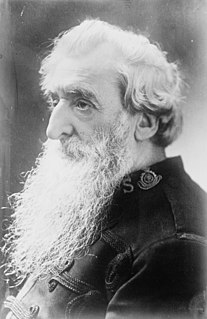A Quote by J. C. Ryle
Let us awake to a sense of the perilous state of many professing Christians. 'Without holiness no man shall see the Lord'; without sanctification there is no salvation (Hebrews 12:14). Then what an enormous amount of so-called religion there is which is perfectly useless!
Related Quotes
'Strive for peace with all men, and for the holiness without which no one will see the Lord' (Heb. 12:14), Why did he say 'strive'? Because it is not possible for us to become holy and to be saints in an hour! We must therefore progress from modest beginnings toward holiness and purity. Even were we to spend a thousand years in this life we should never perfectly attain it. Rather we must always struggle for it every day, as if mere beginners.
Every Christian should find for himself the imperative and incentive to become holy. If you live without struggle and without hope of becoming holy, then you are Christians only in name and not in essence. But without holiness, no one shall see the Lord, that is to say they will not attain eternal blessedness. It is a trustworthy saying that Jesus Christ came into the world to save sinners (I Tim. 1:15). But we deceive ourselves if we think that we are saved while remaining sinners. Christ saves those sinners by giving them the means to become saints.
The whole life of Christians ought to be an exercise of piety, since they are called to sanctification. It is the office of the law to remind them of their duty and thereby to excite them to the pursuit of holiness and integrity. But when their consciences are solicitous how God may be propitiated, what answer they shall make, and on what they shall rest their confidence, if called to his tribunal, there must then be no consideration of the requisitions of the law, but Christ alone must be proposed for righteousness, who exceeds all the perfection of the law.
This, then, is the foundation of sanctification in Reformed theology. It is rooted, not in humanity and their achievement of holiness or sanctification, but in what God has done in Christ, and for us in union with him. Rather than view Christians first and foremost in the microcosmic context of their own progress, the Reformed doctrine first of all sets them in the macrocosm of God's activity in redemptive history. It is seeing oneself in this context that enables the individual Christian to grow in true holiness.
The missionary is no longer a man, a conscience. He is a corpse, in the hands of a confraternity, without family, without love, without any of the sentiments that are dear to us. Emasculated, in a sense, by his vow of chastity, he offers us the distressing spectacle of a man deformed and impotent or engaged in a stupid and useless struggle with the sacred needs of the flesh, a struggle which, seven times out of ten, leads him to sodomy, the gallows, or prison.
And so one may be without connection with any church, and even without connection with any established religion, and yet be in spirit, hence in reality, a much truer Christian than hosts of those who profess to be His most ardent followers, as indeed Jesus Himself so many times says. "By their fruits ye shall know them," said He. "Not every one that saith unto me, Lord, Lord, shall enter into the kingdom of heaven; but he that doeth the will of my Father which is in heaven."
Christ will be master of the heart, and sin must be mortified. If your life is unholy, then your heart is unchanged, and you are an unsaved person. The Savior will sanctify His people, renew them, give them a hatred of sin, and a love of holiness. The grace that does not make a man better than others is a worthless counterfeit. Christ saves His people, not IN their sins, but FROM their sins. Without holiness, no man shall see the Lord.
Oh, give our frightened souls the sure salvation for which, O Lord, You taught us to prepare. And when this cup You give is filled to brimming with bitter suffering, hard to understand, we take it thankfully and without trembling, out of so good and so beloved a hand. Yet when again in this same world You give us the joy we had, the brightness of Your Sun, we shall remember all the days we lived through, and our whole life shall then be Yours alone.
Everywhere the tendency has been to separate religion from morality, to set them in opposition even. But a religion without morality is a superstition and a curse; and anything like an adequate and complete morality without religion is impossible. The only salvation for man is in the union of the two as Christianity unites them.



































